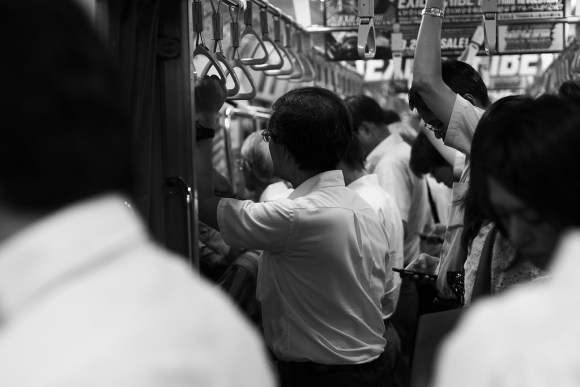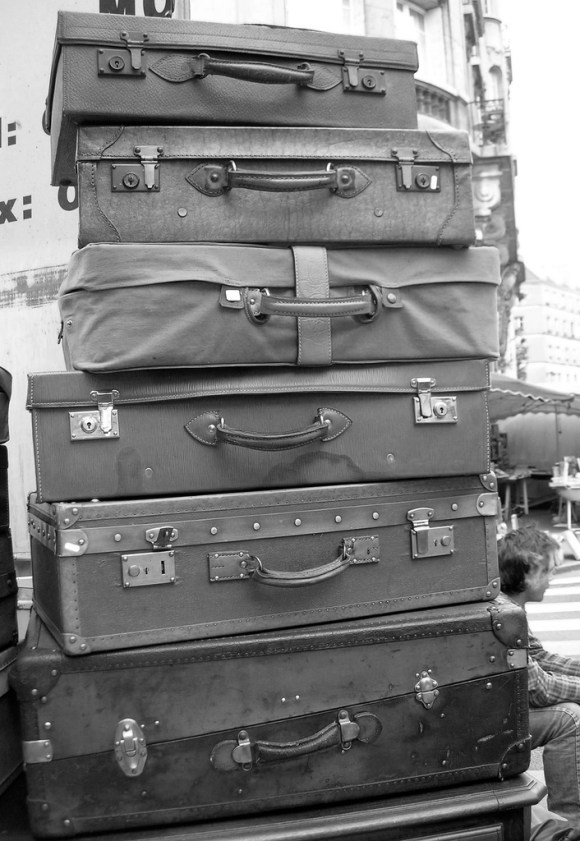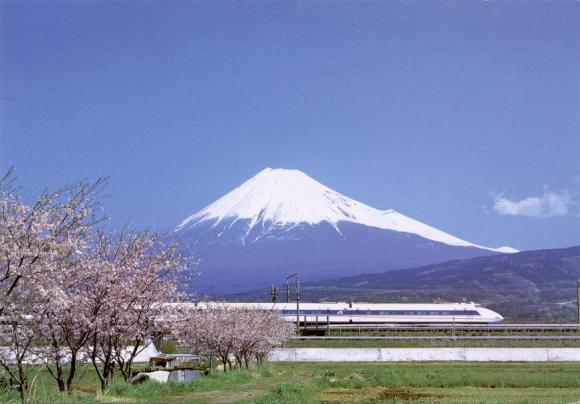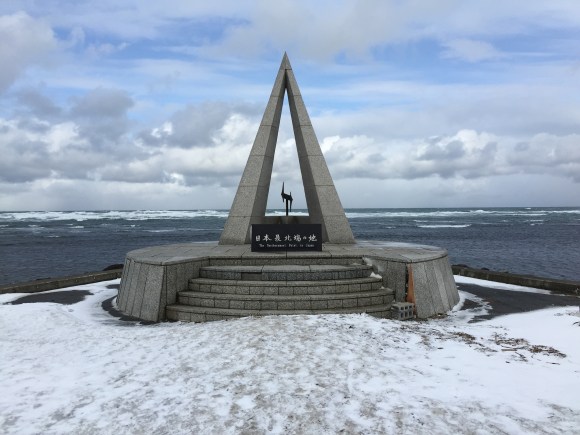
We recently regaled you with Truly Terrifying Japanese Train Stories told to us by foreigners, which included everything from runaway trains to perverts and nuns. Today, we’re going to relate to you foreigners’ stories of unbelievable acts of kindness they’ve experienced on Japan’s trains.
You’ve probably already heard a few stories of Japanese people doing good deeds, like lost property being returned or someone helping out the hapless foreigner who doesn’t speak the language. But Japan’s special brand of kindness goes much deeper than this. You know, things that when you see them they make you think, “Wow, that would never happen in my country!”
Join us for some miso soup for the soul: stories of extreme kindness on Japanese trains, after the jump.
These stories are especially relevant now that Japan will be hosting the 2020 summer Olympics. One of the ways Japan boosted their bid to win the Games was by promoting the theme of omotenashi–-Japanese hospitality–which sometimes manifests itself in the form of extreme kindness and hospitality.
Let’s start with random acts of kindness…
“Upon my arrival in Tokyo when I moved to Japan, I didn’t know about the airport bag delivery service. I took it upon myself to go from Narita Airport to my hotel in Asakusa via the Narita Express and the Tokyo Metro. I had so many bags that I had to make three trips up and down the escalators. A kind Japanese man offered to help me out with my luggage from Asakusa Station all the way to my hotel. We still keep in touch to this day, and I even spent a New Year’s Eve with his family in Tokyo once!”
And random acts of sympathy…
“My friend threw up on the train one night after drinking too much. Within 15 seconds the Japanese people around us had taken out tissues and cleaned up the train floor and then handed more tissues to my friend to clean herself up. After 30 seconds, it was like it never happened at all.”
“I broke my ankle when I passed out on a JR train on my way to work one morning (a combination of no breakfast, not enough sleep and low blood sugar). I came to as four Japanese guys were carrying me off and putting me gently down on the station platform at Shin-Osaka. A most amazingly kind station staff member escorted me in the ambulance to the hospital and sat with me for four hours.”
I was on my way back from work during rush hour. All the overhead straps were either taken or I couldn’t reach them, so I just stood there teetering in my high heels next to a four-seater, the kind with two bench seats facing each other. The local trains can jostle one around quite a bit, and during one such jolt, I found myself launched, face first, into the crotches of the people sitting on the bench seats. However, you’ll be glad to know there is a way to avoid this should you ever be in this situation yourself:
“Once I was taking the last Hankyu train from Umeda (Osaka) back to Kyoto and it was so crowded that there was nothing to hold on to. A total stranger (she later said her name was Kaori) held my hand for 20 minutes until she reached her stop at Takatsuki. Talk about a random act of kindness!”
The 36 train views of Mount Fuji…
“I was nodding off in the Shinkansen once and a Japanese woman across the aisle suddenly tapped me on my shoulder. She said, ‘Sorry, I know you were trying to sleep, but the view of Fuji-san is so clear today. It’s very rare, so I wanted you to see it.'”
On the other hand, it may not seem so kind when a foreigner does it, unless done exactly right…
“I was on the Keiyo Line one fine day and was astounded at how clear the view of Mount Fuji was: perfect with a snow-covered top, blue sky, and it looked so close! I was overwhelmed, absolutely bubbling over and I had to share my feelings of excitement with someone, anyone, even to the point of embarrassment. So, finally one fella opened his eyes and, using my limited Japanese I said ‘Fuji san, Fuji san!’ but he shook his head and went back to sleep. I was shocked and saddened. Then it hit me: the man must have thought I was mistakenly calling him Mr. Fuji.”
What kind of tea is served in the Green Car? Green tea, of course…
“My mum and I met up in Japan, each with a different Japan Rail Pass — hers for the very expensive first class Green Cars, mine not. We booked our seats accordingly, but I would try to sit with her in the Green Car if possible. All the conductors ignored my unsuitable rail pass, although one or two told me quietly that, if the Green Car filled up, I would have to move to one the regular cars. On the Tsubame in Kyushu, the Green Car did fill up, and the conductor discreetly came and asked me to follow her to the conductor’s room. There, she plied me with green tea and we chatted until we reached our destination!”
At the northernmost point in Japan, people are even nicer…
Japan Railway service is pretty darn good, but so is their bus service. This is what happened to two train tour leaders when they combined the two.
“We were escorting a group of train aficionados around Japan. The group was staying at Asahikawa in Hokkaido and traveled on the Super Soya to Wakkanai with the intention of visiting Cape Soya. At Wakkanai Station we attempted to buy 26 JR bus tickets to the cape but the man behind the counter immediately made a telephone call and after a little while put the phone down and sold us a group ticket. He then told us where to wait and gave us a departure time which was a little earlier than that shown in the JR bus timetable. All our group were ready and waiting at the appointed time along with quite a few local passengers. The man who had sold us the ticket then arrived just as the bus pulled up in front of us. This was a coach – not the expected town bus. The man ushered us aboard and told the locals to wait as this was not their bus. He had secured us our own private coach heading for Cape Soya! The driver made what otherwise would have been on the local unscheduled stops along the way, and took us to the top of a hill from which we could admire the cape and Sakhalin Island in the distance. After a brief pause he drove down to the normal bus stop and let us off there. We then established the time for the return trip, which was five minutes before the regular bus would leave. As this was virtually a non-stop run we then had time to explore Wakkanai before boarding the Super Soya back to Asahikawa.”
When you gotta go, you gotta go…
“I was on the last train of the night, headed to Kofu on the Minobu-sen. The restroom was locked and I really needed to go. I flagged down the conductor and explained that I have kidney problems, could he unlock the restroom. He said to wait. Great… A few more stops and he comes by a few times, asking if I can can bear it just a bit longer. The train arrived at a tiny rural station, where a train on the opposite tracks was also pulling in. The conductor locked the door of the control room, left the train and ran across the platform to talk to the other train’s conductor. The conductor of my train then came back and told me ‘Come with me, you can leave your luggage.’ He escorted me off the train, out of this tiny country train station, to the public toilets outside. He waited dutifully for me, then escorted me back to the train full of befuddled passengers.”
We hate to say it, but now we’ve gotta go too. But please share your omotenashi stories with us in the comments section below!
Featured image: Flickr (Mikael Leppa)






 Awesome Japanese wife “kidnaps” her husband as he leaves work…for his own good
Awesome Japanese wife “kidnaps” her husband as he leaves work…for his own good Woman kills self jumping onto train tracks, delay causes conductor to jump off tracks at other station
Woman kills self jumping onto train tracks, delay causes conductor to jump off tracks at other station Bus driver’s kind service towards blind passenger wins praise from Taiwanese netizens
Bus driver’s kind service towards blind passenger wins praise from Taiwanese netizens Hero lady apparently saves guy from groping accusations by posing as girlfriend
Hero lady apparently saves guy from groping accusations by posing as girlfriend Shinkansen driver disciplined for taking poop break while train was going 150 kilometers an hour
Shinkansen driver disciplined for taking poop break while train was going 150 kilometers an hour Japan’s new difficult-to-drink-from beer glass protects your liver, but it’s a brutal experience
Japan’s new difficult-to-drink-from beer glass protects your liver, but it’s a brutal experience How to order snacks on a Shinkansen bullet train in Japan
How to order snacks on a Shinkansen bullet train in Japan New samurai glasses are Japan’s latest weird must-have souvenir
New samurai glasses are Japan’s latest weird must-have souvenir New Pokémon ice cream, dessert drinks, and cool merch coming to Baskin-Robbins Japan【Pics】
New Pokémon ice cream, dessert drinks, and cool merch coming to Baskin-Robbins Japan【Pics】 Doraemon found buried at sea as scene from 1993 anime becomes real life【Photos】
Doraemon found buried at sea as scene from 1993 anime becomes real life【Photos】 Burger King Japan suddenly adds Dr. Pepper and Dr. Pepper floats to its menu nationwide
Burger King Japan suddenly adds Dr. Pepper and Dr. Pepper floats to its menu nationwide Starbucks Japan welcomes alpacas for cute summer drinkware line【Photos】
Starbucks Japan welcomes alpacas for cute summer drinkware line【Photos】 High-fashion Totoro cuddle purse is like an elegant stroll in the forest【Photos】
High-fashion Totoro cuddle purse is like an elegant stroll in the forest【Photos】 Studio Ghibli hair accessories keep your style tidy with help from Kiki, Moro, Calcifer, and more
Studio Ghibli hair accessories keep your style tidy with help from Kiki, Moro, Calcifer, and more What if Sailor Moon characters were lingerie models? They’d look stunning like this 【Photos】
What if Sailor Moon characters were lingerie models? They’d look stunning like this 【Photos】 Nintendo history you can feel – Super NES, N64, and GameCube controllers become capsule toys
Nintendo history you can feel – Super NES, N64, and GameCube controllers become capsule toys Hello, cosmetics! Clinique teams up with Hello Kitty this summer for first-time collaboration
Hello, cosmetics! Clinique teams up with Hello Kitty this summer for first-time collaboration Demon Slayer: Kimetsu no Yaiba gets new roller coaster attractions and food at Universal Studios Japan
Demon Slayer: Kimetsu no Yaiba gets new roller coaster attractions and food at Universal Studios Japan “The most Delicious Cup Noodle in history” – Japan’s French Cup Noodle wins our heart【Taste test】
“The most Delicious Cup Noodle in history” – Japan’s French Cup Noodle wins our heart【Taste test】 Starbucks releases a cute Frappuccino and Unicorn Cake…but not in Japan
Starbucks releases a cute Frappuccino and Unicorn Cake…but not in Japan Kyoto Tower mascot termination reveals dark side behind cute Japanese characters
Kyoto Tower mascot termination reveals dark side behind cute Japanese characters McDonald’s Japan’s Soft Twist Tower: A phantom ice cream only sold at select branches
McDonald’s Japan’s Soft Twist Tower: A phantom ice cream only sold at select branches Yabai Ramen: What makes this Japanese ramen so dangerous?
Yabai Ramen: What makes this Japanese ramen so dangerous? Finally! Nintendo Japan expands Switch 8-bit controller sales to everybody, Online member or not
Finally! Nintendo Japan expands Switch 8-bit controller sales to everybody, Online member or not Japanese government wants to build luxury resorts in all national parks for foreign tourists
Japanese government wants to build luxury resorts in all national parks for foreign tourists To combat declining birth rate, Japan to begin offering “Breeding Visas” to foreigners
To combat declining birth rate, Japan to begin offering “Breeding Visas” to foreigners 10 things you should buy at 7-Eleven in Japan
10 things you should buy at 7-Eleven in Japan Studio Ghibli releases anime heroine cosplay dresses that are super comfy to wear
Studio Ghibli releases anime heroine cosplay dresses that are super comfy to wear Woman charged for driving suitcase without a license in Osaka
Woman charged for driving suitcase without a license in Osaka Studio Ghibli unveils My Neighbour Totoro miniature house model
Studio Ghibli unveils My Neighbour Totoro miniature house model Kyoto experiencing problems with foreign tourists not paying for bus fares, but not on purpose
Kyoto experiencing problems with foreign tourists not paying for bus fares, but not on purpose Fighting mild hunger with a Japanese soda that turns into jelly in the stomach【Taste test】
Fighting mild hunger with a Japanese soda that turns into jelly in the stomach【Taste test】 Studio Ghibli’s Howl’s Moving Castle tapestry unveiled in Japan for first time
Studio Ghibli’s Howl’s Moving Castle tapestry unveiled in Japan for first time McDonald’s new Happy Meals offer up cute and practical Sanrio lifestyle goods
McDonald’s new Happy Meals offer up cute and practical Sanrio lifestyle goods Sales of Japan’s most convenient train ticket/shopping payment cards suspended indefinitely
Sales of Japan’s most convenient train ticket/shopping payment cards suspended indefinitely Sold-out Studio Ghibli desktop humidifiers are back so Totoro can help you through the dry season
Sold-out Studio Ghibli desktop humidifiers are back so Totoro can help you through the dry season Japanese government to make first change to romanization spelling rules since the 1950s
Japanese government to make first change to romanization spelling rules since the 1950s Foreigner’s request for help in Tokyo makes us sad for the state of society
Foreigner’s request for help in Tokyo makes us sad for the state of society Ghibli founders Toshio Suzuki and Hayao Miyazaki contribute to Japanese whisky Totoro label design
Ghibli founders Toshio Suzuki and Hayao Miyazaki contribute to Japanese whisky Totoro label design Tokyo’s most famous Starbucks is closed
Tokyo’s most famous Starbucks is closed Princesses, fruits, and blacksmiths: Study reveals the 30 most unusual family names in Japan
Princesses, fruits, and blacksmiths: Study reveals the 30 most unusual family names in Japan Foreign passenger shoves conductor on one of the last full runs for Japan’s Thunderbird train
Foreign passenger shoves conductor on one of the last full runs for Japan’s Thunderbird train JR East to equip trains station staff with bodycams to protect them from attacks
JR East to equip trains station staff with bodycams to protect them from attacks Japanese train company issues official apology for “inexcusable” 25-second early departure
Japanese train company issues official apology for “inexcusable” 25-second early departure Man dressed as Batman’s Joker commits stabbing/arson attack on Tokyo train on Halloween night
Man dressed as Batman’s Joker commits stabbing/arson attack on Tokyo train on Halloween night Shinkansen conductor caught playing GPS smartphone game on bullet train…for TEN years
Shinkansen conductor caught playing GPS smartphone game on bullet train…for TEN years $2.34!? Cheapest bullet-train ride in Japan lasts 3 minutes, but memories are forever【Photos】
$2.34!? Cheapest bullet-train ride in Japan lasts 3 minutes, but memories are forever【Photos】 Man with death wish and/or nerves of steel waits for passing train INSIDE crossing gates
Man with death wish and/or nerves of steel waits for passing train INSIDE crossing gates Shinkansen safety staff made to sit right next to bullet trains running at 300km/h
Shinkansen safety staff made to sit right next to bullet trains running at 300km/h Narita Airport shuttle buses – Cheaper than the train, but which bus is best?
Narita Airport shuttle buses – Cheaper than the train, but which bus is best? Twitter users share 16 heartwarming moments of kindness in Japan
Twitter users share 16 heartwarming moments of kindness in Japan Things go from scary to sweet when Japanese traveler meets tattooed man on bus overseas【Manga】
Things go from scary to sweet when Japanese traveler meets tattooed man on bus overseas【Manga】 Train brought to emergency stop because someone coughed in it
Train brought to emergency stop because someone coughed in it Drunken salaryman’s solution to barely missing the last train: Ride on the outside of it
Drunken salaryman’s solution to barely missing the last train: Ride on the outside of it Bus driver in Yokohama City announces warm message to the mother of a screaming child
Bus driver in Yokohama City announces warm message to the mother of a screaming child Four things women are banned from doing in Japan【Women in Japan Series】
Four things women are banned from doing in Japan【Women in Japan Series】
Leave a Reply